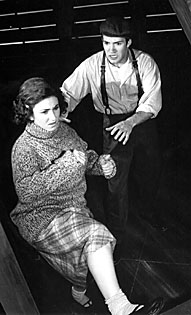 |
|
PHOTO COURTESY OF ARIZONA REPERTORY THEATRE
|
Arizona Repertory Theatre's "The Cider House Rules" is about the life of Homer Wells, an orphan who leaves the protective environment of the orphanage and his mentor Dr. Larch, to learn about the outside world.
|
|
By Lisa Schumaier
Arizona Daily Wildcat
Thursday February 27, 2003
Students love controversy. The Arizona Repertory Theatre presents "The Cider House Rules," a two-part play that contains as much edge as the Grand Canyon. "The Cider House Rules" is all set to provide that controversy. With only two previews, it is still too early to tell just exactly how audiences will react.
"The previews went well. There is definitely some material that people might find offensive in the show. So we are kind of seeing what is happening. We don't know what we are getting ourselves into," Michael Tennant said.
Tennant plays the main character, Homer Wells.
"I play this character, from the second he is born to 37 years old. I am so honored to be able to play a character that has an incredible range of life."
"The Cider House Rules" has gained popularity from the movie and novel by John Irving. The stage version was written by Irving as well.
"The film was kind of the heartwarming story of the year. It came out the same year as ╬American Beauty' and ╬Fight Club' and other movies that pushed people's buttons but the play has turned out not to be that kind of thing," Tennant said. "The rape and incest, infidelity and life-long lies ¸ all which is very uncomfortable to be sitting 15 feet away from it. You can get away with a lot in a movie because you are watching an actor on a screen and it was filmed a year ago, as opposed to living breathing people that you might see right after the show is over."
The exact issues that have cast and crew anticipating mixed feedback are issues that have the American government in a schism as well ¸ most notably, the topic of abortion.
"We have been warning everyone that it is not your normal kind of play. It is not terribly offensive but it deals with the woman's right to choose. He looks at both sides of issues with great detail. People should know that it is a pro-choice story," Director Harold Dixon said.
"There is a scene where I find the fetus and I hold it up. Nobody makes a sound in the audience. They are like ╬I knew it would be about abortion but not this in my face about it.' The story ends up being a little pro-choice but it argues all sides," Tennant said.
The 30th anniversary of the Roe v. Wade decision brings a commemorative significance to the story. However, that was not an aspect planned in its production.
"I wish I could say it was all a great plan but it is such dumb luck that we just stumbled on the perfect time to be doing it. It didn't occur to me until recently," Dixon said.
Although critics will be focusing on reproductive rights as the majority of the show, the story is also about love and relationships.
"The issue of abortion plays a prevalent role and there are some simulated sex acts. But it is kind of a funny show because it is very wholesome and sweet and tender and heartwarming and at the same time is gritty and it explores some issues we wish it wouldn't explore," Tennant said.
"But it is a fantastic coming-of-age story. There is a great love story and father-son relationships."
The play centers on the life of Homer Wells, an orphan who leaves his hometown and only father figure, Dr. Larch. In an attempt to experience the outside world and confront his own beliefs, Homer has to decide the validity of abortions on his own.
"The audiences so far have been riveted to the stage. Everyone was totally silent and really involved. People didn't walk out," Dixon said.
Perhaps the greatest realization of the story is not the ultimate wrong or right of a complex issue. Expressed as mundanely yet blatantly as the title, "The Cider House Rules" is about life between the lines.
"There are the rules other people set for us in life and then there are the rules that we follow in life everyday. Human beings speak for themselves as opposed to the rules of society, our boss and parents set for us," Tennant said. "I want the audience to walk out feeling like they have experienced something. Whether they liked it or not, I want them to walk out affected."

